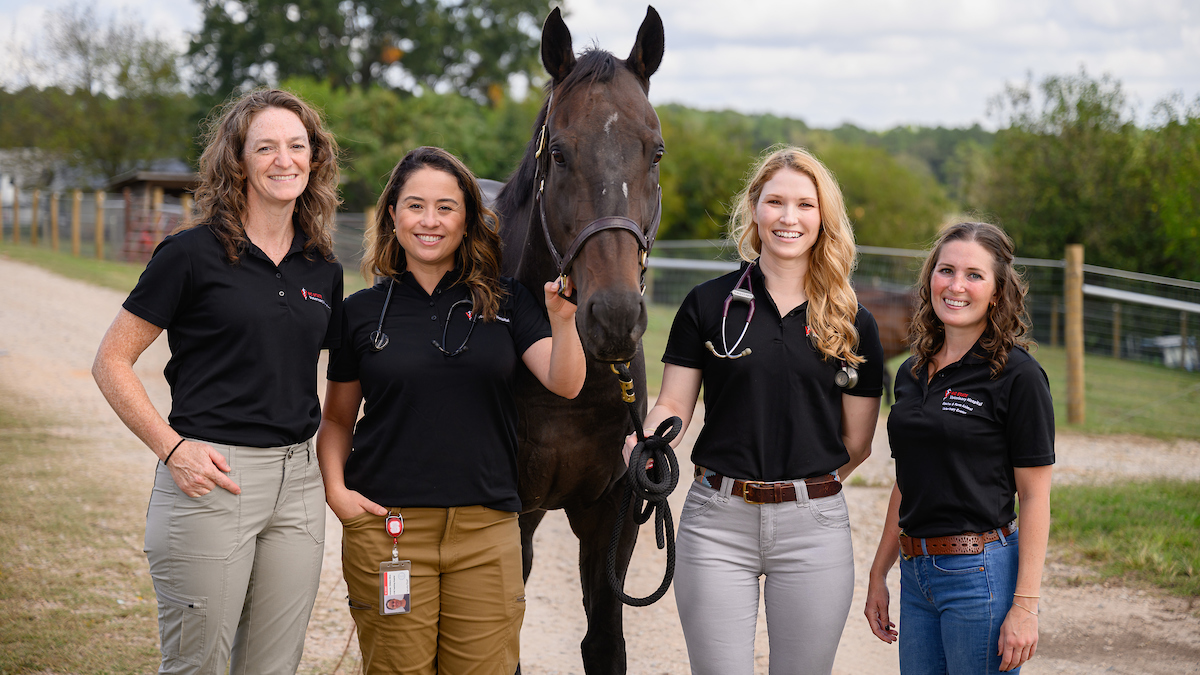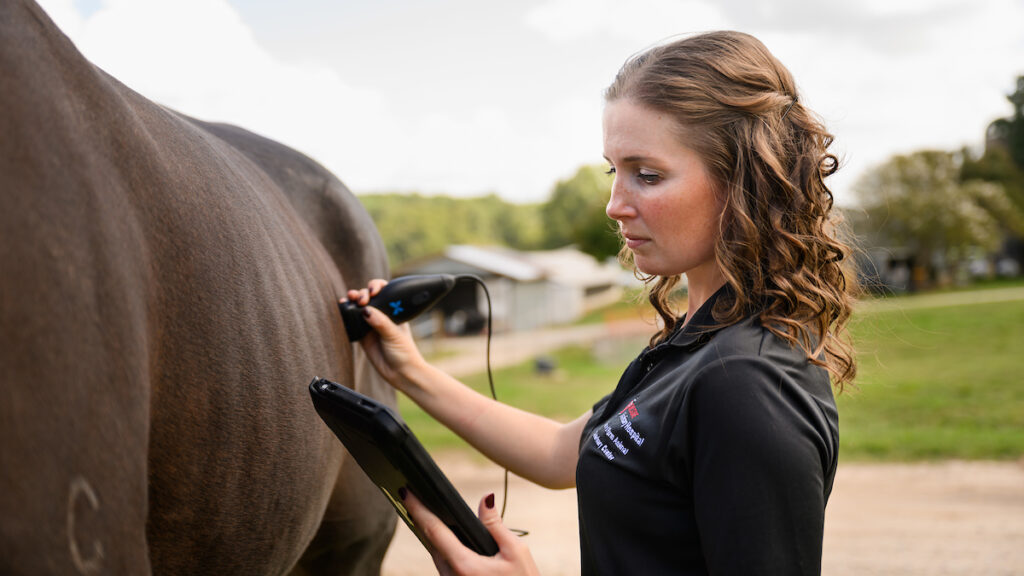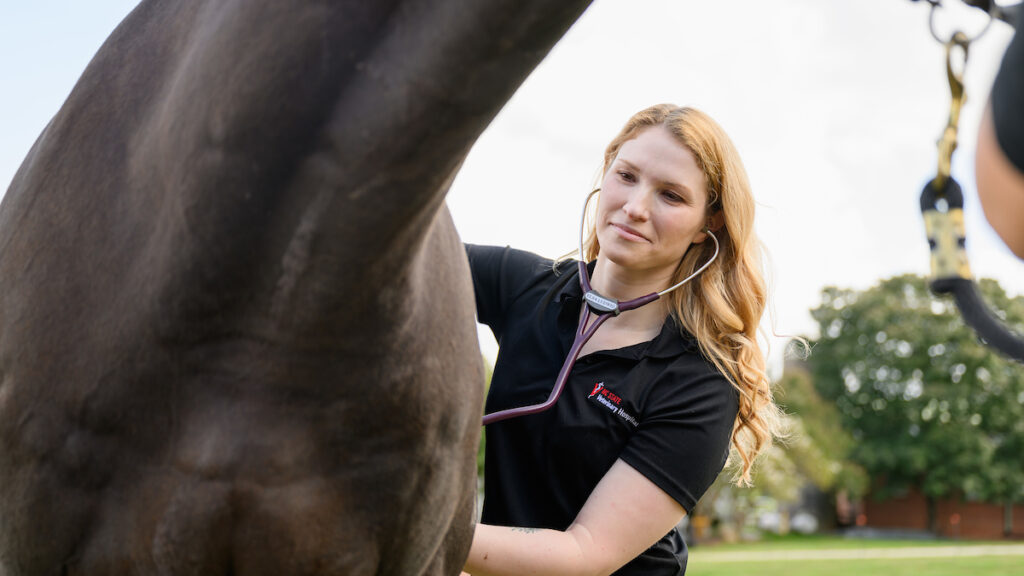NC State’s New Emergency Equine Service Already a Success for Horse Owners, Vets and Students

By all accounts, the pilot Ambulatory Equine Emergency Service that the NC State College of Veterinary Medicine began offering July 14 has been a mission-fulfilling marvel.
The service is addressing a desperate community need by supporting area equine practices, increasing emergency medical experience for veterinary students and proving that a subscription-based financial model is viable enough to possibly expand the critical service later.
It’s also more than satisfying horse owners, such as Toni H., whose mare had a lameness emergency on the first day of the partnership. When she called her local veterinarian’s emergency number, she was connected with the NC State emergency service doctors, who arrived within 30 minutes.
“They texted me along the way letting me know what their ETA was,” Toni said in a Facebook post. “This was a wonderful experience all the way around. And I have to add that the charge for an early Saturday morning call was extremely reasonable! I, as a personal horse owner and as the Horse Coordinator for Helping Horse, feel very confident in this partnership and know that my horses will have excellent care 24/7.”
NC State, a leader in equine medicine, has wanted for years to offer local equine veterinary practices help with covering emergency hours. Having to be on-call during nights and weekends is one of the No. 1 reasons that equine veterinarians leave the profession and that veterinary students don’t choose it. Having a state-funded university provide the help, though, required that the service at least break even.
“What is new this time is the subscription component of this initiative,” says Dr. Callie Fogle, clinical professor of equine surgery, who shepherded the project through the necessary bureaucratic steps. “We’ve entered into agreements with three local practices that pay a monthly fee to have emergencies covered by the NC State Equine Ambulatory Emergency Service. It was finally financially feasible for the CVM to take this on.”
Fogle says she saw the idea in an article in The Chronicle of the Horse about an equine emergency-only practice in Louisville, Kentucky, and engaged practices within 40 miles of the NC State campus in Raleigh to see who might be interested in a pilot project.
“We wanted to keep the commitment from everyone reasonable and make sure we could successfully provide excellent service on a small scale before growing it or offering it to all practices in the area,” she says.

After NC State College of Veterinary Medicine Dean Kate Meurs approved the project, the college hired two of its Ph.D. students – Dr. Emily Hellstrom and Dr. Elsa Ludwig, who already had specialized training in equine veterinary medicine – to start covering 50 percent of emergency hours for the three practices.
This month, the college also hired Dr. Amanda Silva, a full-time working equine veterinarian with 10 years of equine experience, to take over the other half of the off-hours coverage. Between July 14 and the end of September, the NC State veterinarians have gone out on 60 emergency cases and handled more than 50 consultation calls.
Dr. Bob Meyer owns Neuse River Equine Hospital, one of the practices participating in the pilot, and he is simply ecstatic by the win-win-win nature of the service.
“I’ve been on call in one form or another since 1984,” says Meyer, whose practice in Wendell, North Carolina, has about 1,200 clients. “Not being on call is an amazing feeling. You can go to dinner at a nice place and not worry about getting interrupted. I’m used to eating fast-food just in case. It changes your whole outlook on your evenings and weekends.”
After graduation, equine veterinarians face many challenges to making equine practice a lifelong career, one of which is trying to maintain a healthy work-life balance. Emergency and on-call expectations force equine veterinarians to constantly choose work over family and contribute to burnout in the profession, Fogle says.
Only 5 percent of veterinary graduates are interested in equine medicine and only half of those still specialize in horses five years later, Meyer points out.
“Being able to say you’re going to have less on-call duty is going to be huge for us when it comes to hiring quality people and keeping them for the long run,” Meyer says. “A lot of new graduates want to have a family, want to have a life outside of work, and having little emergency duty or no emergency duty ideally makes that balance between work and life a bit better.”
Meyer also cites the emergency experience veterinary students will get as they go out on calls with Silva and with Hellstrom, whose Ph.D. focus is on researching how to improve postoperative outcomes for equine colic patients, and Ludwig, a board-certified large animal surgeon working on a Ph.D. and researching tissue viability following a severe intestinal injury..
“It’s a small percentage of the cases we see that we have to refer to the teaching hospital, but those are the only ones the students see,” Meyer says. “This is a great opportunity for them to see other kinds of emergencies that aren’t critical care but can’t wait until 8 a.m. Students will be better prepared when they go out into the field, because they’ll be able to see the emergencies that aren’t catastrophic enough to make it into the hospital.”

Fogle says the NC State College of Veterinary Medicine also is thrilled about how well the service is working for everyone involved.
“The driver to start with most definitely was the community need to find a sustainable way to cover an emergency,” she says. “But the education of the students is a great opportunity and one of the reasons that vet schools are uniquely positioned to do something like this. It addresses a critical community need and gives students valuable experience.”
Expanding the service next year to solo equine veterinarians and other practices is the goal, Fogle says, who hopes to find flexible ways for the service to accommodate smaller practices and practices that see more than just horses.
“If it wasn’t for Dr. Fogle, it wouldn’t have gone anywhere,” Meyer says. “Her support staff has done their share of the work, too. Dr. Fogle has done a patient and thorough job of getting this done, and we couldn’t be happier.”
- Categories:


